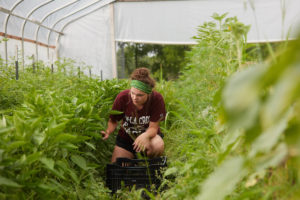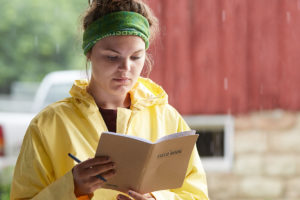Posted 3:26 p.m. Friday, Oct. 9, 2020

UWL senior applies farming roots, anthropology research to solve real-world social problems.
UWL student Olivia Schauls walks by rows of vegetables growing at Old Oak Farm, near Bangor, Wisconsin. “We have fennel, varieties of kale, peppers, rainbow chard, onions, eggplant, cilantro and tomatoes,” she says as she passes lines of lush leaves. Past the barn, at the top of the hill, corn stalks meet the horizon line as far as the eye can see. “It’s huge — a pretty place to work,” she adds. A summer internship at Old Oak Farm is the best job she’s ever had, she explains. It combines her rural Wisconsin farming roots with her undeniable enthusiasm for local and organic food, as well as the people who grow it.

This is Schauls’ second summer working on Old Oak Farm, but it is the first time the UWL senior is applying her UWL cultural anthropology studies on the farm. Through her cultural anthropology classes, Schauls’ has learned about how systems in place for producing and consuming food impact people. While some people may visit a grocery store and pick avocados from Mexico or oranges from Florida with little thought of where those foods originated, Schauls and anthropologists consider who benefited and who suffered in this contemporary process of getting food from farm to shelf. Growing food locally and organically has its benefits, explains Schauls. In addition to supporting the local economy and providing people access to fresh and nutritious produce, it cuts down on a huge amount in energy to transport products long distances. “I hope CSAs [Community Supported Agriculture] and farmer’s markets become bigger in the future,” she says. “It would cut down on so much waste in the world.”
“I hope CSAs and farmer’s markets become bigger in the future”
Through her research on the farm, Schauls could help expand the public’s knowledge on the best ways to get local food to local people. She aims to understand how Old Oak Farm’s Community Supported Agriculture Program can best meet needs of consumers and farmers. Funding for her summer research comes from the Prairie Springs Endowment Fund, which supports research and scholarship at UWL in the areas of environmental studies and education, wildlife habitat protection, wildlife protection, conservation and ecological technology. The fund was created when UWL received a $2 million gift from Prairie Springs: The Paul Fleckenstein Trust. The gift also named UWL’s new science labs building the Prairie Springs Science Center. Through CSA programs, members receive weekly boxes of fresh produce during the growing season from area farms. Schauls’ research will determine why customers join the Old Oak Farm CSA program and whether a new model for the CSA, where customers can choose what goes in their box versus a random selection, is a better model based on customer needs. Schauls’s work requires interviewing CSA customers, in addition to a range of farm tasks from planting to delivering food to CSA drop-off points. Her participation at the farm is integral to her studies, she says, as she can be the one holding direct conversations with consumers. Schauls grew up on a dairy farm near Frederic, Wisconsin, where spent summers helping her mother garden. She didn’t realize values from her youth could become a focal point of her future until she took an “Anthropology of Food” course with Associate Professor Christine Hippert. When people think about healthy and sustainable eating, they may think about food components like the amount of fat or protein, or about keeping the environment healthy via organic agricultural practices, says Hippert. But just as important, she adds, is fair labor practices for farmers.

“Cultural anthropologists study how different agricultural practices affect people's livelihoods — you can't eat if you don't work for a livable wage,” she explains. “If consumers eat organic food they might have better health outcomes, but if that food is produced by people who can't feed their families, then that's not sustainable. Most people forget that economics is a part of culture.” Schauls calls Hippert “a role model” who is “so passionate about what she does.” After graduating, Schauls plans to follow a similar path, attending graduate school in anthropology with the goal of becoming a professor one day. The Prairie Springs Endowment Fund serves as a way to promote environmental leaders for tomorrow. Through the study of anthropology, Schauls’ is helping to discover a future that helps to maintain not only the environment, but the health of people's bodies, and communities by supporting local farmers' livelihoods.
